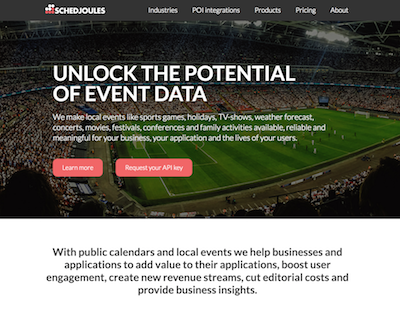While we normally use our blog interviews to feature members of the geo community today we speak with Rutger Geelen, co-founder and CEO of a fellow API based business (and OpenCage customer!): SchedJoules.
Rutger, thanks for talking with us!
1. Who are you and what is SchedJoules?
My name is Rutger Geelen. I’m one of the co-founders of SchedJoules. SchedJoules knows what events are happening in the world. We aggregate, curate and distribute event information via API’s and SDKs to applications that integrate that information to get more revenue, higher end-user engagement and smoother operations.
We build three services (API’s) on top of that information:
-
a public calendar service with 190.000 public calendars for sport, TV, holidays, finance and weather
-
a event discovery service answering the question ‘what is happening at at a specific time at a specific place’
-
a crowd prediction service answering the question ‘how many people will be at a place in the future’
2. Why did you build Schedjoules? Who uses it?
My and my partner, Wilfred, started SchedJoules one afternoon because we always went to Ajax football matches and we were fed up with entering the matches manually in our calendar every year. We assumed more people had that problem. Many of our clients are calendar applications that want to offer public calendars to their end users. We also work in the leisure and travel industry.
3. Tell us a bit about how you use geodata in the service?
Reliable geodata is very important to us. Events are always a combination of location, time and subject. Any of those are off and our clients can’t rely on our service. We use geodata to complete or correct missing data, to combine different events happening at the same time and place and to provide extra informatie around an event.
4. Any advice for running a high volume API-based service, we’re always keen to learn.
So far no suggestions. The getting started, the examples and the Ruby gems helped us on our way pretty quickly. The content looks good.
5. Managing an ever changing database of worldwide geodata can, at times, be an absolute nightmare. But anytime I get depressed I think to myself, “well at least we dont have to deal with dates and times”. You do, though. Can you share some of the technical challenges? Any horror stories?
There is a brilliant website with tons of time and data related falacies: yourcalendricalfallacyis.com For us a couple of returning issues are:
-
Dealing with time zones. Many services think that since they only have local data so providing a timezone is unnecessary. This has probably woken up a traveler or two in the middle of the night since their calendar was still on their local time.
-
Another interesting thing is the UI of calendars. In the UI there must always be a start time and and end time. A lot of events don’t have a specific end time. Think of sports matches but also Jewish holidays which run from sunset til next sunset.
-
We never realised how politicised public holidays are. We always follow holidays as determined by the local government but one’s freedom fighter is a another men’s terrorist. We get complaints about official holidays that make people angry.
6. What’s next for SchedJoules?
A couple of new things we are currently working on are:
-
Some of the event categories that we collect and distribute we do so world-wide; others more local. We sometime need to say no to the client since of the data they ask we don’t provide yet. We are working on solving that.
-
We are always on the look out for new data categories. Astronomical events is an example of data that many people ask for.
-
We are going to test our service in the hotel and taxi business soon.
Many thanks, Rutger, and congrats to you and your team on your business. It is wonderful to see an API based business similar to our thriving. While I certainly do not envy your technical challenges, I wish you all good luck as you continue to grow SchedJoules.
happy geocoding,
Please let us know if your community would like to be part of our interview series here on our blog. If you are or know of someone we should interview, please get in touch, we’re always looking to promote people doing interesting things with open geo data.
